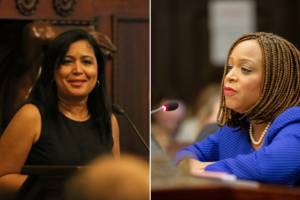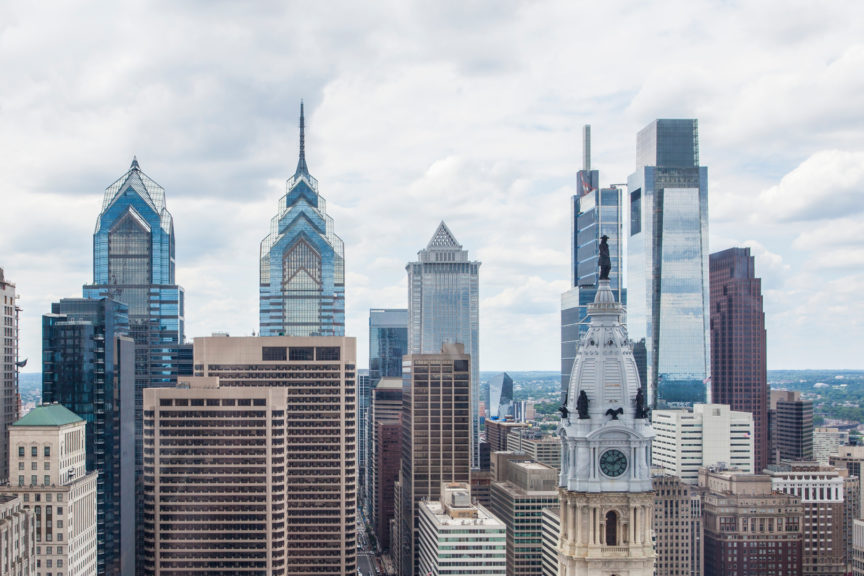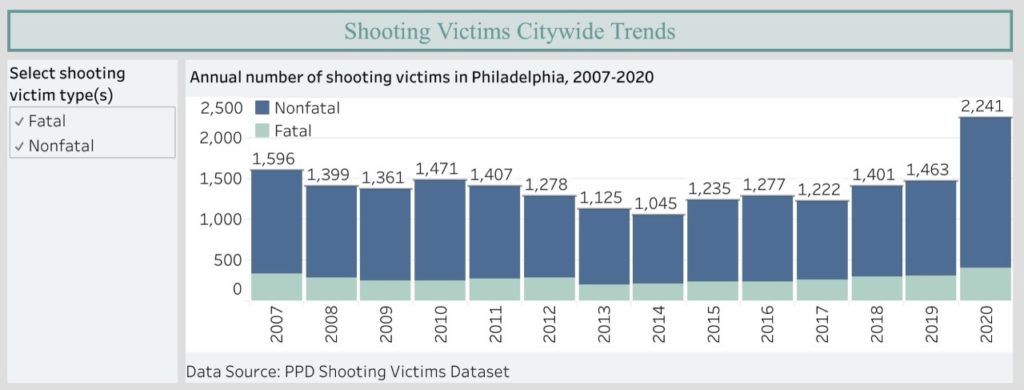COUNCIL APPROVES FY2022 BUDGET WITH INVESTMENTS IN VIOLENCE PREVENTION, NEIGHBORHOOD PRESERVATION, AND POVERTY REDUCTION
On Thursday, City Council gave final approval to a FY2022 municipal budget that invests over $155 million in violence prevention programs to curb gun violence, funds a $400 million program to create affordable housing, preserve neighborhoods and spur job growth, supports efforts to lift Philadelphians out of poverty, continues reforms in policing, and commits funds to revitalize the city’s arts, culture and hospitality sectors.
The $5.2 billion budget received final approval by a 16-1 vote in Council, with Councilmember David Oh (At Large) voting in opposition.
Toplines on the budget approved by Council:
Violence Prevention. With the city in the grip of a deadly gun violence epidemic that has claimed 262 lives through Thursday – 38 percent ahead of last year’s pace, Council voted to approve $155 million in violence prevention spending that includes $68.3 million in new funds. Included in the new spending number — about $30 million in programs not previously proposed by the Kenney administration. Councilmembers responding to the gun violence crisis demanded more spending, with an emphasis on funding grass-roots, community-based groups working in neighborhoods to reduce violence.
On Thursday, Mayor Kenney and Council leaders on gun violence jointly announced a Violence Prevention & Opportunity Monitoring Group, composed of mayoral and Council appointees, that will ensure grass roots applicants have the technical expertise to receive city funding. All applicants will adhere to the city’s standard contracting rules.
“This is a paradigm shift in how we deal with violence,” said Councilmember Kenyatta Johnson (2nd District), chair of Council’s Special Committee on Gun Violence Prevention. “The new Violence Prevention & Opportunity Monitoring Group will help non-profit grassroots groups understand the city’s contracting process, and make sure they have the chance to receive a portion of the funding available in the new budget. The goal of the increased funding to community groups is to support community-based violence interventions and make a greater impact in reducing gun violence in our neighborhoods.”
Neighborhood Preservation. The budget approved by Council supports financing of a $400 million Neighborhood Preservation Initiative, an ambitious citywide program that will invest in affordable housing, inclusive jobs in the trades, funding for first-time homebuyers and existing homeowners to repair their homes, renter protections against eviction, and neighborhood commercial corridor revitalization.
Poverty Reduction. The budget invests an additional $10 million in Council’s Poverty Action Plan, on top of $10 million invested last fiscal year. This public-private effort, championed in Council by Councilmember Maria Quiñones Sánchez (7th District), Council President Darrell L. Clarke (5th District), and Councilmember Allan Domb (At Large), aims to lift 100,000 city residents out of poverty within four years.
Fiscal Stability. During the last fiscal year, the COVID-19 pandemic’s impact saw Philadelphia facing a budget deficit of more than $400 million. Thanks to the American Rescue Plan from President Biden, and prudent fiscal decisions by the Kenney administration and City Council, the deficit is eliminated in the new budget – a fiscal stability that is a core responsibility of local government.
The budget makes numerous other investments, in the arts and culture and hospitality sectors (over $12 million), in affordable housing and the Land Bank ($6.5 million), among other allocations.
“Did we do everything for everyone? Absolutely not, nor do we ever. But we addressed all of the issues that Philadelphia needs,” Council President Clarke said in remarks on Council’s virtual floor after the budget passed.
The spending plan now goes to Mayor Kenney for his signature. The city’s new fiscal year starts July 1st.
COUNCIL APPROVES COUNCILMEMBER JOHNSON’S LEGISLATION TO PAY PREVAILING WAGES TO FRONTLINE WORKERS AT PHILADELPHIA INTERNATIONAL AIRPORT
Last October, Councilmember Isaiah Thomas (At Large) introduced the Driving Equality Bill to remove Philadelphia police from most traffic stops. After months of negotiating with the Defenders Association of Philadelphia, the Police Department, and Law Department, an agreement has been reached. Councilmember Thomas introduced updated legislation which outlines the intent for preventing racial disparities with policing without risking public safety.
“We need to rethink police-community relations in a way that does not infringe on public safety. I believe that my Driving Equality Agenda does just that,” said Councilmember Thomas. “A person of color’s first exchange with a police officer shouldn’t be during a discriminatory traffic stop. By working closely with the Police Department, we were able to identify traffic stops that do nothing to keep people safer and remove the negative interaction. I believe this legislation can set a precedent for other cities, not only through the policy itself but through the collaborative process.”
The Driving Equality Agenda codifies “secondary vehicle code violations” as not having an imminent public safety risk (outdated registration or a broken taillight) and would no longer warrant a traffic stop. The legislation also codifies “primary vehicle code violations” as possessing imminent public safety risk (intoxicated driving or driving the wrong way down a one-way street) and a traffic stop would still be permissible. In addition to this legislation, a second piece of legislation would require a searchable database of traffic stops with regular reporting.
The Driving Equality Agenda was introduced in Council Thursday. A public hearing will occur this Fall, and is expected to have an accompanying Executive Order from the Kenney administration.
SEEN ON SOCIAL MEDIA…
Families with children could get $250 or $300 per child monthly thanks to the expanded Child Tax Credit. Even if you have little or no income it’s easy to sign up.
Learn how to get your payment ➡️ https://t.co/D7T8oOiHPY pic.twitter.com/WL3yU6ymbZ
— City of Philadelphia (@PhiladelphiaGov) June 22, 2021
IN OTHER NEWS…
Councilmember Gilmore Richardson’s Curfew Reform, Workforce Development Bills Pass Council. Legislation from Councilmember Katherine Gilmore Richardson (At Large) to reform Philadelphia’s minor curfew law, along with a bill requiring businesses to share career pathways information passed Council.
The curfew reform bill simplifies the minor curfew law by making the times easier to understand. It also makes the law less punitive by removing all fines and changing the requirements that young people must be taken to a police district. Councilmember Gilmore Richardson has been working with the administration to establish evening resource centers, safe spaces where minors who violate curfew can be taken to be connected to support services. Funding for two evening resource centers was included in the FY22 budget which passed Council.
“Violence is impacting our children at alarming rates,” Councilmember Gilmore Richardson said. “Reforming the curfew law allows us to improve enforcement without being punitive. With the creation of evening resource centers, young people and their families can be connected to community-based resources.”
The workforce development and career pathways information bill requires employers to provide an information sheet, created and updated by the Department of Labor, to workers either at the start of employment for gig workers or at the point of separation for other workers. The requirement can be met electronically.
“To address generational poverty in Philadelphia, we must tackle our stratified labor market,” said Councilmember Gilmore Richardson. “This legislation will help more Philadelphians move into family supporting and sustaining careers by providing them with information about job training and educational opportunities when they may need it most. Businesses, labor unions, and workforce development providers all strongly support this simple change that will help us create a more equitable, more skilled Philadelphia workforce.”
 Councilmembers Quinones Sanchez and Gauthier Introduce Mixed Income Neighborhoods Overlay Legislation. Councilmembers Jamie Gauthier (3rd District) and María Quiñones Sánchez Thursday introduced the Mixed Income Neighborhoods Overlay Bill, which aims to require that affordable housing be part of new large development projects. This bill will apply to select tracts of the 3rd and 7th Districts that are seeing increased market pressures where Philadelphia residents will be especially vulnerable to displacement without additional policy interventions.
Councilmembers Quinones Sanchez and Gauthier Introduce Mixed Income Neighborhoods Overlay Legislation. Councilmembers Jamie Gauthier (3rd District) and María Quiñones Sánchez Thursday introduced the Mixed Income Neighborhoods Overlay Bill, which aims to require that affordable housing be part of new large development projects. This bill will apply to select tracts of the 3rd and 7th Districts that are seeing increased market pressures where Philadelphia residents will be especially vulnerable to displacement without additional policy interventions.
“Mandatory inclusionary zoning is a big piece of the puzzle when we talk about equitable development and giving Philadelphians equal access to amenity-rich neighborhoods—both of which are core components of my agenda,” said Councilmember Gauthier. “The mixed income housing bonus has been successful—but the time has come to see where it can be taken further, and how we can ensure affordable units are available in neighborhoods where new developments are built. I thank Councilmember Sánchez for her partnership, and look forward to engaging with our communities.”
The bill would require 20 percent affordability in any new development with ten or more residential units within the overlay boundaries. Ten percent of total units would have to be on the property itself, while the other 10 percent could either be on site, within a half mile of the new building, or replaced by a payment to the Housing Trust Fund. The on-site units must be affordable for rental households earning up to 40 percent area median income (AMI), and for owner-occupied households earning up to 60 percent of AMI. Property owners would be entitled to additional development rights, such as additional building height or reduced parking requirements.
“Diverse, mixed income neighborhoods need strong public policy that incentivizes and promotes equitable development,” said Councilmember Sánchez.
In order to have thoughtful dialogues with constituents, Councilmembers Gauthier and Sánchez plan to carry out community and stakeholder engagement efforts in their districts. Councilmember Gauthier will launch a ‘Summer of Engagement’ during July and August around topics of housing affordability and development pressures in West and Southwest Philadelphia. Her office will carry out a variety of engagements, including focus groups, canvassing, and pop-up events, in order to reach as many constituents as possible.
Councilmember Sánchez has been conducting joint RCO meetings in the 7th District and will continue to work with stakeholders from PACDC and the BIA’s Affordable Housing Committee to facilitate compliance to the new standards.
OTHER SIGHTS AND SOUNDS FROM THE COUNCIL WEEK
Committee on People with Disabilities and Special Needs 6-21-2021
Stated Meeting of Philadelphia City Council 6-24-2021
PHILADELPHIA FACTS AND FIGURES
The next Stated Meeting of City Council is scheduled to take place on Thursday, September 16, 2021 at 10 a.m. The Meeting will air on Xfinity Ch. 64, Fios Channel 40 and stream at www.PHLCouncil.com/watch.
Feature Photo: BeauMonde Originals for Visit Philadelphia




